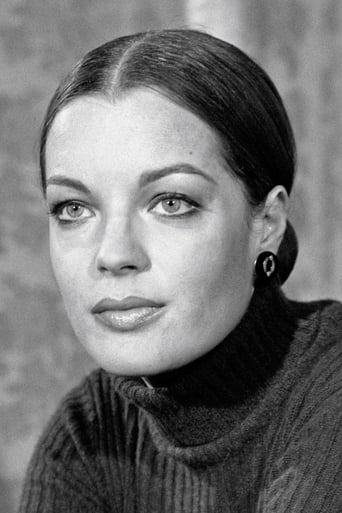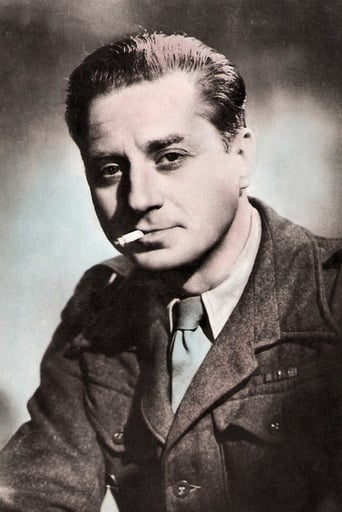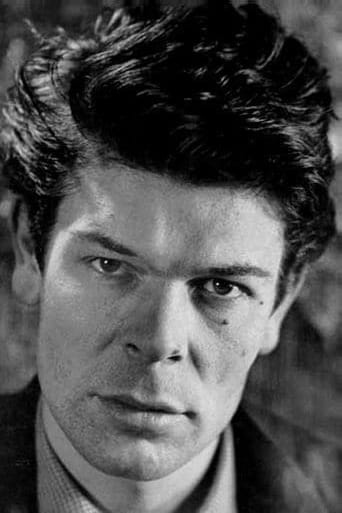lasttimeisaw
Hardly anything witty about love has dawned on Zulawski's third feature, an almost exclusively chamber drama, where a burgeoning attraction between a pornography photographer Servais Mont (Testi) and a second-rate actress Nadine Chevalier (Schneider), has barely taken off from the platonic struggle, because Nadine is married to Jacques (Dutronc), to whom she bears a tangible fusion of gratitude, responsibility and affection, which complicates their situation into a torrid emotional abyss so as to testify that love is indeed the most inscrutable, unpredictable, yet the most important thing.Crammed in the high-ceiling, antique-looking Parisian apartments and loci like theatre, bar and hospital, its mise-en-scène strains to stay claustrophobic, fluid and quivering, signals the characters' shaky states, but, Zulawski and the screenwriter Christopher Frank fail to let their emotions run the full gamut to reach out its dazzled viewers, a stately but shallowly anaemic Testi cannot portray a role, whose inner depth is apparently out of his league, fumbles and routinely daydreams from scene to scene, his fervent gaze can not justify Servais' actions, his thoughts, and the limp dialogue doesn't help either.Ms. Schneider, won Best Actress in the first-ever César Awards, is palpably more tapped into her role, sending off her raw charisma into her inwardly paralysed psyche, she tries to be frank with her own feelings, desire, dignity and pride at her own peril, but there are too many smoke and mirrors around to indulgently mystify an uncompounded, and fragmented story-line, the only thing to ameliorate the faint exasperation is when the pure dramatic sequences take the stage: Kinski's spit-fire flare-up is a mood-enforcer, Dutronc stands out in his chummy whims and delightfully erratic behavioural conundrum, a peculiar man who withdraws into a reprieve from, in an obvious tenor, a husband's functionality (abruptly falls into slumber so that his wife can only hopelessly play with herself to slake her desire), but also hatches up something seemingly unspeakable and inexplicable with Servais through an undertone of self-abandonment and total capitulation, in a muscle-versus-quirk contest over the same woman.Zulawski's highbrow ambition to extract something refine and sophisticated out of the triangular deadlock doesn't consummately do the trick, in the end, Servais has to pay his debt with his blood and internal bleeding, from a father figure Mazelli (Dauphin), in his case, love IS the most important thing, if he can endure all the pain both physically and mentally, to demonstrate his unconditional devotion.Georges Delerue's score is ever so conspicuous whenever a close-up is zoomed in between Servais and Nadine, to cloyingly illustrate their passion, otherwise, it remains forbidding and sinister, circles around a pessimistic account of love, in its purest but strangely tepid manifestation.
leiser18
I just bought the DVD of this film and will never cease regretting it. This is the most awful Romy Schneider film I have seen, and I have seen most of her movies, including the ones filmed in Germany (Sissi, etc.).The 70's produced the weirdest films and I probably should have known better: if Klaus Kinski was in it, it cannot be good. But I love Romy Schneider and so I went for it.I will probably never see this movie again because I couldn't sit through this pretentious crap twice. I cannot understand how anyone could like this film. I didn't even like Romy in it, and that says a lot, given that she's one of my favorite actresses.If one reads the description of the movie plot, one is deceived as the story is not as simply told as described. I wish I could get my money back, but I bought the DVD from Amazon.de (Germany) - too much hassle to return it. I'll just throw in the trash instead and good riddance.
audrius-darguzis
A very simple, and (thus) extremely powerful film. And, sadly, underrated. It's a mind-opening experience. It doesn't say anything new or different on the subject, its simplicity and consistence shows loud and clear that...love is nothing but pain, but it's the only thing worth fighting (living; feeling pain) for; the only thing that sets you free. When Schneider's personage finds an earlier repulsive photograph dying in his desolated apartment you get to feel that now she cannot not love him... A very sincere, believable, touching film resembling real life and real love. Every actor's work is praise-worth, and worth the film's title. They knew what each of them were talking about. And no wonder Kinski took part in this. (The mood of this film is somehow similar to Last Tango in Paris.) You can almost feel wounded along with these 'people' that are being thrashed by love.
taylor9885
This is a film for manic-depressives or people on amphetamines, maybe. I have rarely seen such frenetic activity outside of martial-arts pictures, yet the story is simple: a woman tires of her limp husband (Dutronc)and tries to start up with a much more masculine type (Testi). The milieu is the porn movie business which Schneider's character works in, interwoven with the classical theatre world she would like to belong to.Romy Schneider got the Cesar award for her performance here; she pulls out all the stops to create this gifted but battered-by-life character. Pity that Zulawski couldn't craft a more balanced film around her.





